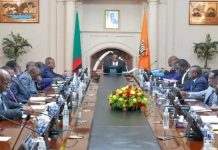Africa-Press – Zambia. The United Nations Commission for Africa – UNECA and the Africa Input and Export Bank have brought in their expertise to actualise the car battery project between Zambia and the Democratic Republic of Congo – DRC.
Minister of Commerce, Trade and Industry Chipoka Mulenga stated that the two multilateral institutions will play a key role in the feasibility studies of the car battery project.
Mr Muenga added that two production plants will be set up in Zambia where the car batteries will be produced. “We have identified a place for the car battery plant and this is in Ndola, we may not only do with one plant, we may set up two or three plants, but to start with, our focus is making sure that we first set up this plant in Ndola,” he said
He mentioned that the stakeholders that are willing to help with the feasibility studies, have engaged a contractor who will be coming in very soon, to take a look at the Ndola plant, adding that the reason for choosing to set up the car battery plant in Ndola is because its located on the Copperbelt which has an abundance of mineral resource and also to revive Ndola as an industrial hub that it used to be in the past.
“Over the years we have been crying to say Ndola is no longer as an industrial hub like it used to be as much of the industries that used to be are just being used as truck parks today,” Mr Mulenga said
Zambia and the Democratic Republic of Congo signed a cooperation agreement in April last year to facilitate the development of value chain in electric car batteries and clean energy sector, the agreement will strengthen value chain for the production of batteries for electric cars which will be key to the economies of Zambia and the Democratic Republic of Congo.
The establishment of Zambia – DRC Cooperation Agreement on the Establishment of the Value Chain in the Electric Battery and Clean Energy under a common governance framework called DRC – Zambia battery Council is a great milestone for the two sister countries. Zambia and Congo DR hold slightly above 70% of the World’s cobalt reserves.
The electric car battery industry will contribute in creating massive green jobs for the youths and transitioning to a clean energy pathway as a major initiative to reducing greenhouse gas emissions and climate change effects. If harnessed, the electric car battery industry will contribute to financing the implementation of Zambia’s Nationally Determined Contributions (NDCs) and achieving Zambia’s green growth agenda by the year 2030.
The Nationally determined contributions (NDCs) are the heart of the Paris Agreement on climate change as a longer term initiative to respond to the overall objective of the United Nations Framework Convention on Climate change (UNFCCC) of 1992. The NDCs are an effort by each country in the world to reduce their national carbon emissions and adapt to the impacts of climate change.
Zambia alone require about US$ 50 billion to implement its NDCs and joins the rest of the World in the Race to Zero carbon emissions which is a global campaign to rally leadership and support from businesses, cities, regions, investors for a healthy, resilient, zero carbon recovery that prevents future threats, creates decent jobs, and unlocks inclusive, sustainable growth.
The USA government alone has proposed an increased federal procurement of electric batteries by $400 billion in the first term of President Joe Biden Administration. The goal is to purchase and implement key clean energy inputs like batteries, with the goal of positioning the US as the world’s clean energy leader. Zambia and Congo DR should take advantage of the US EV market which is projected to grow to US$400 billion and the European Market which is expected to reach $855.17 billion by 2028.
I call upon the government of Congo DR and Zambia to begin identifying car manufacturing companies from big markets such as the USA, China, India and EU and begin to engage them in the manufacturing of electric car batteries.
At the United Nations Climate Change Summit (COP26) in Glasgow last year about 24 developed countries and a group of major car manufacturers such as Ford, Volvo, Jaguar, Land Rover and Mercedes Benz committed to work towards zero emission cars by 2040 to meet the Paris Agreement goals including limiting global warming to 1.5 degrees Celsius. More than 100 countries agreed to greening the transport sector by signed the Glasgow Declaration on Zero Emission Cars and Vans and the sale of internal combustion engines by 2035 in leading markets and by 2040 globally.
For More News And Analysis About Zambia Follow Africa-Press







